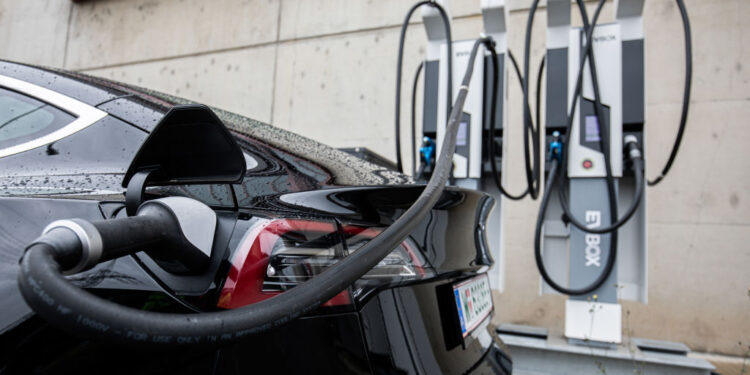The cost of charging an electric vehicle in Britain is soaring toward the cost of filling a car with gasoline amid the nation’s energy crisis.
According to data released on Monday by RAC, the price of charging an electric car on a pay-as-you-go basis at public charging stations has increased by 42% since May. While the cost of charging an electric vehicle battery with the quickest charging option to 80% capacity was £17.51, or $18.72, in September 2021, the price one year later is £32.74.
Electric vehicle owners are now paying 18 pence, or 19 cents, per mile for electricity — slightly lower than 19 pence per mile for a car powered by gasoline.
Although most residents of the United Kingdom who drive electric cars typically charge their vehicles at home with an average cost per mile of 9 pence, not every driver has the same option. “The huge price gap between home and public charging highlights the extent to which drivers who depend on the charging network, including those who don’t have driveways and can’t charge at home, pay a hefty premium to run electric cars,” according to RAC.
The average cost of gasoline in the United Kingdom is presently £1.64 per liter, or $6.20 per gallon. After surpassing $5.00 per gallon in early June, gas prices in the United States have subsided to $3.77 per gallon as of Wednesday, according to data from AAA.
“For those that have already made the switch to an electric car or are thinking of doing so, it remains the case that charging away from home costs less than refuelling a petrol or diesel car, but these figures show that the gap is narrowing as a result of the enormous increases in the cost of electricity,” RAC spokesman Simon Williams explained. “These figures very clearly show that it’s drivers who use public rapid and ultra-rapid chargers the most who are being hit the hardest.”
As Europe faces soaring energy prices, new British Prime Minister Liz Truss — who has established the goal of rendering the United Kingdom a net exporter of energy by 2040 — announced a new round of oil and gas leases for the North Sea and lifted a moratorium on shale gas production. The ban had been established three years ago amid concerns over earthquakes.
“We are cutting off the toxic power and pipelines from authoritarian regimes and strengthening our energy resilience,” Truss said during a speech to the United Nations General Assembly. “We will ensure we cannot be coerced or harmed by the reckless actions of rogue actors abroad. We will transition to a future based on renewable and nuclear energy while ensuring that the gas used during that transition is from reliable sources including our own North Sea production.”
Meanwhile, member states of the European Union — which Britain exited in early 2020 — have pushed renewable power amid the energy crisis in accordance with the goal of becoming “a climate-neutral society” by 2050.
The rising cost of energy in Europe occurs as the Biden administration incentivizes the adoption of renewable power sources, as well as the purchase of electric cars. The Inflation Reduction Act recently greenlit electric vehicle tax credits of $7,500 for new cars and $4,000 for used cars, according to a fact sheet from the White House.
Transportation Secretary Pete Buttigieg recently nodded to a policy from the California Air Resources Board that will require 35% of new vehicles to produce zero emissions by 2026 — a benchmark that will progressively rise to 100% by 2035. The policy was unveiled days before grid officials in California requested that residents decrease energy usage during peak demand, such as by refraining from charging their electric vehicles, in the interest of averting power failure amid a heatwave.











